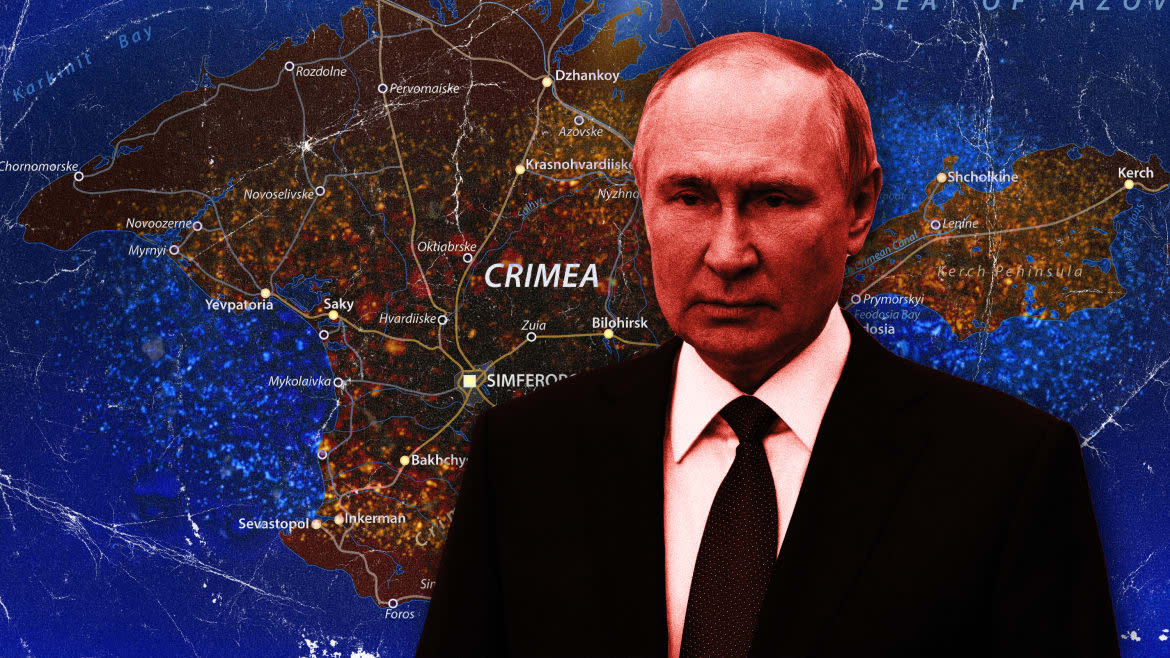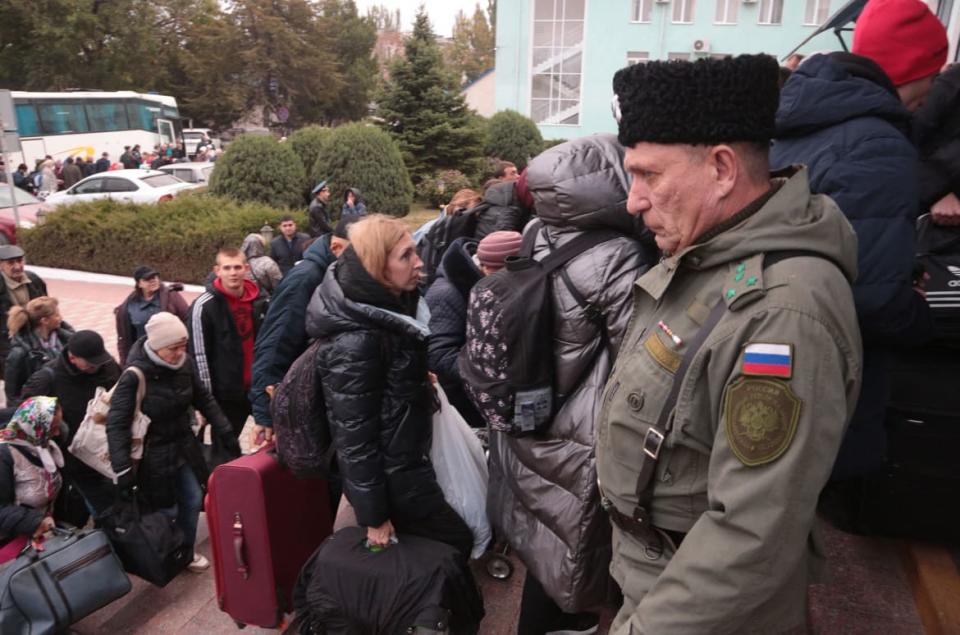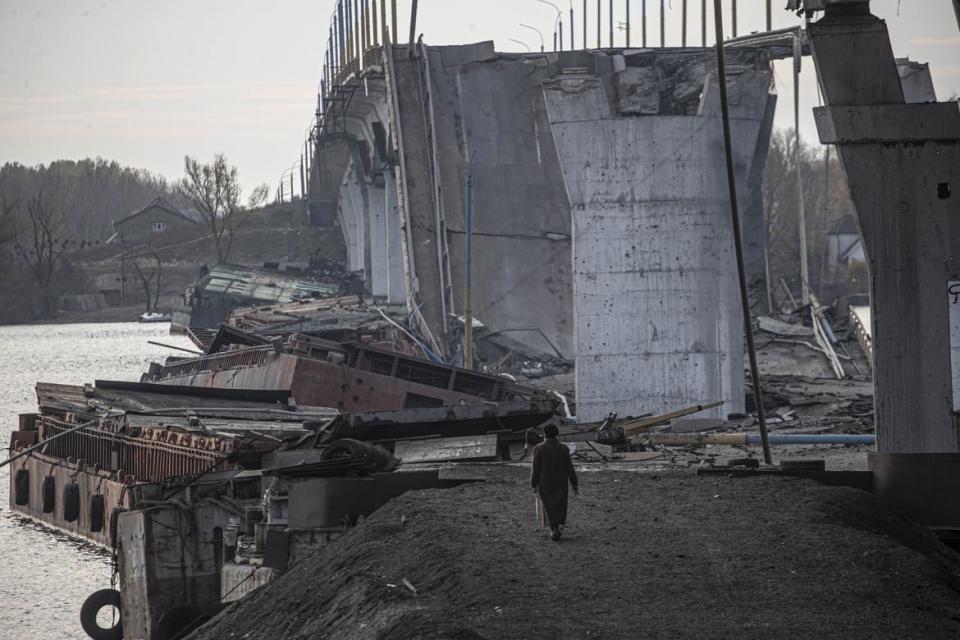The Rupture That Could Trigger Putin’s Deadliest Rampage Yet

- Oops!Something went wrong.Please try again later.
The Kremlin’s chief executioner in Crimea is not modest about having slaughtered some 70,000 of her neighbors.
“We need pitiless, unceasing struggle against the snakes who are hiding in secret,” Rosalia Zemlyachka told the Sebastopol newspaper Vremya. “We must annihilate them, sweep them out with an iron broom, a sea of blood, everywhere.”
Witnessing Zemlyachka’s carnage first-hand, Russian opposition leader Sergei Melgunov said the lampposts of Crimea’s largest city are “richly garnished with wind-swayed corpses.” In the nearby beach resort of Feodosia, Melgunov and other officials said they observed Zemlyachka commandeer the city’s wells as burial pits. When the shafts were clogged with tortured soldiers and civilians, Melgunov added, she strapped her victims to planks, either roasting them alive in furnaces or drowning them in barges in the Black Sea.
“It’s a pity to waste cartridges on them,” Zemlyachka said.
To be sure, Western leaders now wrestling with the question of whether to encourage and fund Ukraine’s intention to grab back Crimea may not be familiar with the Kyiv-born secret policewoman known to locals as Demon.
The Secret Mission to Snatch Crimea Back From Putin’s Clutches
Yet back in Moscow—a century after Zemlyachka, at the end of the Russian Civil War supervised the Bolshevik’s extermination of a population nearly three times the size of Key West—the Demon remains the darling of Russian President Vladimir Putin, a superstar at KGB headquarters, and the poster ghoul for what Russia is capable of doing if Ukraine marches on Crimea.
“Ukraine will be liquidated,” are the words Putin’s celebrated primetime shill and alleged war criminal Vladimir Solovyov employs almost nightly on television to reawaken the spirit of Zemlyachka.
“Russia’s military mindset is always annihilation,” says a veteran Kremlin specialist who spent years in Moscow and remains attached to a Western intelligence agency. “What’s been remarkable since the fall of Kherson is we’ve never before heard Russian politicians and propagandists pushing a terror campaign at a level reminiscent of the Bolshevik Revolution. They are off the charts.”

People arrived from Kherson wait for further evacuation into the depths of Russia at the Dzhankoi's railway station in Crimea on October 21, 2022.
None of this surprises 2022 Nobel Peace Prize Laureate Oleksandra Matviichuk.
“Russians can tolerate their war criminals who win,” Matviichuk told The Daily Beast over a recent dinner in Paris. “Russians cannot tolerate their war criminals who lose.”
Matviichuk, director of Ukraine’s Center for Civil Liberties, says her organization has so far itemized more than 21,000 instances of Russian war crimes in Ukraine. The desecrations in Bucha, Izium, and Kherson are so grisly that she and other human-rights lawyers are now imploring UN member states to “develop a new definition of a war crime and a method to prosecute them,” she says.
Olena Tregub is devoted to assuring Putin’s war criminals are losers. She’s also a woman who knows her guns and ammo. Tregub’s a vocal member of the Ukrainian government’s anti-corruption committee, and her job is to ensure every penny of foreign aid and caisson of weapons sustains a war effort aimed at ultimately unfurling her country’s flag over Crimea.
“We go big,” Tregub says. “We take back Crimea. This is the only way to punish Russia for Putin’s crimes in Ukraine.”
Glorious visions of repelling Russian imperialism for centuries have galvanized the Ukrainian imagination. “The fortifications of the Syvash are so strong that the Red High Command has neither the men nor the machines to breach them,” Vremya guaranteed its readers in 1920. “All the armed forces of the Soviets cannot frighten the Crimea.”
Indeed, General Pytor Wrangel, the German-Baltic commander in charge of defending Crimea, was so certain of victory that he created a new medal of honor called the Order of St. Nicholas the Wonderworker, an award later bestowed on Mother Theresa, Pope John-Paul II, and Kalpana Chawla, the first Indian woman sent into space.
Back on Earth, French Lieutenant General and former NATO commandant Michel Yakovleff says, “I’m not convinced Ukraine needs to recover Crimea.” In an interview with The Daily Beast beneath crystal chandeliers and murals of naked cherubs inside the French Senate, the battle-hardened veteran of Operation Desert Storm and NATO’s campaigns in Bosnia and Kosovo has spent the past nine months huddling with Ukrainian politicians and military strategists.

Antonovski Bridge, which is allegedly demolished to stop Ukrainian forces from crossing the Dnieper River as Russian forces withdrew to its left side of the river, is seen after Russian retreat from Kherson, Ukraine on Nov. 14, 2022. The only transportation road from Kherson to Crimea was the Antonovski Bridge.
“We’re not sure how much of Crimean population would want to return to Ukraine,” Yakovleff cautions. “An internationally sanctioned referendum might be diplomatically in order to accommodate the thousands of Russians involuntarily brought in after the 2014 Russian annexation. There will be internal problems. Taking back Crimea could be a mixed blessing.”
The reaction of Andriy Yermak, an adviser to Ukrainian President Volodymyr Zelensky, pretty much encapsulates Kyiv’s position on which side finally controls Crimea. “Does anyone seriously think that the Kremlin really wants peace?” he wrote on Twitter. “It wants obedience.”
But as the havoc drags on into winter, the only certainty is that the peninsula Moscow’s pizhony or “stylish ones” refer to as the Russian Riviera is the eye of a brewing storm between Ukraine and its Western allies.
“We don’t offer up policy,” the Western intelligence operative says. “We do know how Russia operates, its military abilities and capabilities. Most important, Russians don’t care about losses, and they still have a lot of air power and other dirty tricks to terrorize Ukraine beyond bombs and missiles. Too many people have a hard time accepting those realities.”
The irony of the situation is palpable. “Russia has also been heavily dug into eastern Ukraine for eight years,” he adds. “So it would actually be easier to militarily retake Crimea than the Donbas.”
On the one hand, allowing Crimea to remain Russian and home to the Black Sea fleet might be the tranquilizer that calms Putin into making peace while retaining his power. The intelligence analyst suggests such a brokered peace won’t hold.
“Strategically, rip the Russians apart, because you don’t want to give them time to rebuild and come back, which they will,” he says. “The longer you can force Russia into rebuilding its military, the better off Europe and the rest of the democratic world is.”
On the other blood-stained hand, how much more Russian-induced trauma can Ukraine absorb? Back in 1933, at the height of Stalin’s enforced two-year terror-famine Holodomor, Ukrainians were dying at a rate of 28,000 per day, for a total death count of nearly 4 million people. Yakovleff insists that history ensures a Ukrainian victory this time around.
“Putin is being beaten by what’s become the most powerful army in Europe,” Yakovleff says. “If Putin survives, he would be the only Russian leader to survive a defeat of this magnitude. His personal fate is sealed.”
On the other hand, Hanna Shelest, director of the security and military analysis group Prism in Kyiv, has legitimate cause for concern. “I trained NATO officers at a war college,” she explains. “The only map of Ukraine was in my office. Not one of my students knew the distance between Crimea and the nearest NATO country. It’s the same thing eight years after Putin invaded Crimea,” Shelest adds. “NATO has no strategic vision of Crimea.”
Get the Daily Beast's biggest scoops and scandals delivered right to your inbox. Sign up now.
Stay informed and gain unlimited access to the Daily Beast's unmatched reporting. Subscribe now.

